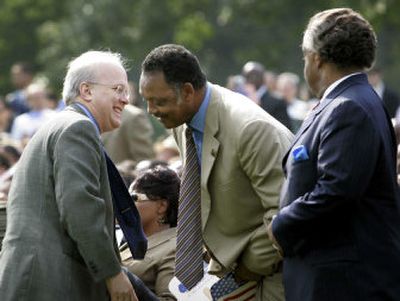Bush signs extension of Voting Rights Act

WASHINGTON – With the nation’s civil rights royalty fanning themselves on the White House lawn, President Bush on Thursday signed a 25-year extension of the law that seeks to protect minorities from obstacles to voting.
He also vowed vigorous enforcement – drawing skepticism from some black leaders, disappointed with his record.
“In four decades since the Voting Rights Act was first passed, we’ve made progress toward equality, yet the work for a more perfect union is never ending,” Bush said. “Today, we renew a bill that helped bring a community on the margins into the life of American democracy.”
Moments later, Congressional Black Caucus Chairman Rep. Mel Watt, D-N.C., praised Bush but warned that rhetoric can’t wash away distrust.
“They’ve not done a great job, but hopefully this is a new day,” he said, adding that some black lawmakers stayed away from Thursday’s ceremony to avoid being viewed “as a backdrop for a political statement.”
The Revs. Jesse Jackson and Al Sharpton were front row in the audience, where Bush adviser Karl Rove went out of his way to welcome them.
The White House defended its record, citing a record number of election monitors deployed since 2001, and the numerous enforcement actions that the Justice Department brought under the Voting Rights Act against states, counties and cities.
The 25-year extension enjoyed wide bipartisan support but was delayed for weeks when southern Republicans in the House rebelled. Some argued that the extension was too long. Others called it unfair that only nine states must seek Justice Department approval for electoral changes.
Civil rights leaders from several generations attended the ceremony, including NAACP Chairman Julian Bond and former head Benjamin Hooks. The civil rights group had long been critical of Bush, and he snubbed it throughout his presidency until appearing last week at its annual meeting.
Rep. Sheila Jackson Lee, D-Texas, who stood just behind the president at the ceremony, said later that regardless of his record, the long-lasting impact is reason to celebrate. “This bill has a life of its own. It’s been renewed for 25 years,” she said.